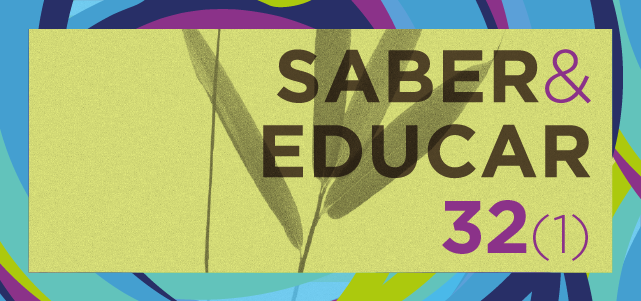"It belongs to everyone!" The right to play and well-being in the playground of a Kindergarten
DOI:
https://doi.org/10.25767/se.v32i1.32622Keywords:
Children, Play, Well-being, Playground, KindergartenAbstract
The aim of this text is to describe and analyse the intervention process carried out in the playground of a kindergarten (JI) in the city of Lisbon, with the objective of promoting the right to play and fostering social equity among children. We present the partial results of a research project XXXX [name of the project], funded by the Horizon 2020 program of the European Commission. The methodology used includes observation, interviews, and photographs as data collection methods, bringing together the Social Studies of Childhood and Educational Sciences. The presented results highlight the changes and improvements implemented in the kindergarten's playground, with special emphasis on ensuring well-being, the right to play, and promoting children's access to and frequency of use of a quality outdoor space.
References
Bento, G., & Portugal, G. (2019). Uma reflexão sobre um processo de transformação de práticas pedagógicas nos espaços exteriores em contextos de educação de infância. Revista Portuguesa de Educação, 32(2), 91–106. https://doi.org/10.21814/rpe.17657
Bodén, L. (2021). On, to, with, for, by: ethics and children in research. Children's Geographies. DOI: 10.1080/14733285.2021.1891405
Christensen, P., & James, A. (2020). Research with Children: Perspectives and Practices. Falmer Press.
Cooke M., Press F., & Wong S. (2020). Educators’ risk-taking in high quality early childhood education. International Journal of Early Years Education, 1–17. https://doi.org/10.1080/09669760.2020.1848531
Davey, C., & Lundy, L. (2011). Towards greater recognition of the right to play: An analysis of article 31 of the UNCRC. Children & Society, 25(1), 3-14.
Ferreira, M. (2022). Play. In C. Tomás et al. Eds.), Key concepts on Sociology of Childhood. Global Perspectives (pp. 79-82). UMinho Editora.
Ferreira, M., & Tomás, C. (2020). A brincar, a brincar… lógicas e sentidos de futuras educadoras de infância (2014-2019). Educação, 45(1), e104/ 1–28. https://doi.org/10.5902/1984644454739
Ferreira, M. & Sarmento, M. (2008). Subjectividade e bem-estar das crianças: (in)visibilidade e voz. Revista Electrônica de Educação, 2(2), 60-91.
Ferreira, M., & Tomás, C. (2022). Investigação com crianças: é possível escapar à observação?. In C. Vieira (org,). Temas, Contextos e Desafios da Investigação Qualitativa em Educação (pp. 269-296). Imprensa da Universidade de Coimbra.
Folque, M. A., & Bettencourt, M. (2018). O modelo pedagógico do Movimento da Escola Moderna em Creche. In J. Oliveira-Formosinho & S. Barros Araújo (Orgs.), Modelos Pedagógicos para a Educação em Creche (p.113-138). Porto Editora.
Hackett, A., Procter, L., & Seymour, J. (2015). Introduction: Spatial perspectives and childhood studies. In Children’s spatialities: Embodiment, emotion and agency (pp. 1-17). Palgrave Macmillan UK.
Korkiamäki, R., & Kaukko, M. (2023). Faceless, voiceless child – Ethics of visual anonymity in research with children and young people. Childhood, 30(1), pp. 55-70.
Moss, P., & Urban, M. (2020). The Organisation for Economic Co-operation and Development’s International Early Learning and Child Well-being Study: The scores are in! Contemporary Issues in Early Childhood, 21(2), 165-171.
Motta, R., & Ferreira, M. (2022). Children/nature interrelationship in outdoor early childhood education: When children and bamboo co-construct a ‘secret hideaway’. Journal of Adventure Education and Outdoor Learning. Advance online publication. https://doi.org/10.1080/14729679.2022.2087193
Pawlowski, C., Andersen, J., & Schipperijn, J. (2019). Changing recess geographies: children’s perceptions of a schoolyard renovation project promoting physical activity, Children's Geographies, 17(6), 664-675, DOI: 10.1080/14733285.2019.1582754
Spyrou, S. (2018). Disclosing childhoods. Research and knowledge production for a critical childhood studies. Palgrave Macmillan.
Stavrides, S. (2015). Common Space as Threshold Space: Urban Commoning in Struggles to Re-appropriate Public Space. Footprint: Delft Architecture Theory Journal, 16, 09–20. DOI: https://doi.org/10.7480/footprint.9.1.896
Street, M. (2021). Theorising child well-being: Towards a framework for analysing Early Childhood Education policy in England. Journal of Early Childhood Research, 19(2), 211–224. https://doi.org/10.1177/1476718X20969841
Sullu, B. (2018). Geographies of children’s play in the context of neoliberal restructuring in Istanbul, Children's Geographies, 16(2), 169-183, DOI: 10.1080/14733285.2017.1341972
Tranter, P. & Malone. K. (2004) Geographies of environmental learning: an exploration of children's use of school grounds. Children's Geographies, 2(1), 131-155, DOI: 10.1080/1473328032000168813
Published
Versions
- 2023-12-14 (3)
- 2023-12-14 (2)
- 2023-12-14 (1)
How to Cite
Issue
Section
License
Copyright (c) 2023 Catarina Tomás, Carolina Gonçalves, Aline Almeida

This work is licensed under a Creative Commons Attribution-NonCommercial-ShareAlike 4.0 International License.
- The opinions expressed by the authors are their exclusive responsibility.
- The journal reserves the right to make the original, normative changes, spelling and grammar, in order to maintain the standard language of worship, while respecting the style of the authors.
- Authors retain copyright and grant the journal right of first publication with the work simultaneously licensed under a Creative Commons Attribution License (BY-NC-SA 4.0) that allows others to share the work with an acknowledgement of the work's authorship and initial publication in this journal.
- Authors are able to enter into separate, additional contractual arrangements for the non-exclusive distribution of the journal's published version of the work (e.g., post it to an institutional repository or publish it in a book), with an acknowledgement of its initial publication in this journal.
- Authors are permitted and encouraged to post their work online (e.g., in institutional repositories or on their website) prior to and during the submission process, as it can lead to productive exchanges, as well as earlier and greater citation of published work (See The Effect of Open Access).
PRIVACY STATEMENT
The names and email addresses entered in this journal site will be used exclusively for the stated purposes of this journal and will not be made available for any other purpose or to any other party.






